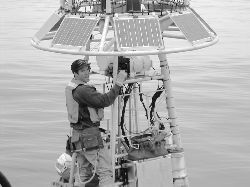 Monterey Bay Aquarium Research Institute (MBARI) in California is a leading center for research and education in ocean science and technology. As part of its research efforts, MBARI maintains moorings – equipped with ocean-monitoring instruments – in Monterey Bay as well as in the equatorial Pacific.
Monterey Bay Aquarium Research Institute (MBARI) in California is a leading center for research and education in ocean science and technology. As part of its research efforts, MBARI maintains moorings – equipped with ocean-monitoring instruments – in Monterey Bay as well as in the equatorial Pacific.
That’s where Mike Kelley comes in. His responsibilities include mooring maintenance, managing individual projects related to the moorings, and personnel supervision.
"One researcher may be concerned with physical science, the next with bio-optical science – and we have to place their respective sensors on the moorings so they don’t act counterproductively. Having a good understanding of ocean processes has been important, too"
“As a supervisor and mooring project manager, I spend about half of my time managing projects and people,” Kelley explains. “The rest is hands-on work: assembling and testing mooring components and in-situ instrument maintenance involving diving and buoy rides.” Examples of the equipment he works on include a vertical profiler – an instrument that travels up and down the mooring cable collecting data – and anti-fouling devices called shutters that help reduce the effects of biofouling (such as buildup of barnacles or algae) on the optical sensors.
Kelley’s formal education includes a B.S. in oceanography with a chemistry emphasis and advanced SCUBA diver and scientific diver training. After college he spent seven years as a consultant in coastal physical oceanography programs – working in places such as New Zealand, Australia, Southeast Asia, Alaska, and the Gulf of Mexico. Eight years ago he was hired as a research technician at MBARI. He also worked as a mooring technician before taking his current position.
As ocean observatory supervisor, Kelley relies both on his formal education and skills developed on the job. “My interdisciplinary degree has been a huge benefit,” he explains. “For example, one researcher may be concerned with physical science, the next with bio-optical science – and we have to place their respective sensors on the moorings so they don’t act counterproductively. Having a good understanding of ocean processes has been important, too.”
"Many of the instruments we use simply didn’t exist several years ago"
A lot of the technical side of Kelley’s position has been learned on the job. “Many of the instruments we use simply didn’t exist several years ago,” he points out.
The skills he finds important for his job are wide-ranging. There are electrical, mechanical, and software issues to the mooring components, so understanding those areas is critical. The intangibles – people skills, a positive attitude, and problem solving – are equally important. “When you’re dealing with a diverse group of people, keeping everyone working together is essential,” Kelley says. And as for problem solving: “It’s research, so there are always last-minute hitches and repairs to the equipment or the moorings themselves.”
Kelley is a strong believer in hands-on experience. His advice for students considering a career in marine technology is simple: “Get experience. Take the knowledge and skills you develop in school and put them to work in the real world, either through volunteering or an internship.”
He is very optimistic about future career opportunities in this field. “There are a lot of proposals for observatory networks right now – not just at MBARI,” Kelley says. “Those networks will involve moorings, benthic nodes, and other equipment that will require technicians to maintain, assemble, and deploy them.”
<< Back to Profiles Start Page
|
|
